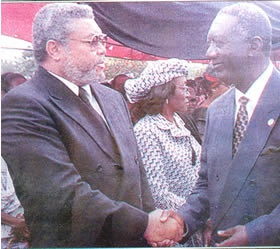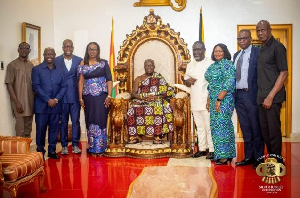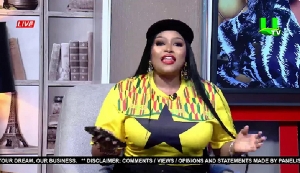General News of Tuesday, 11 July 2006
Source: GNA
2006-07-11Poll: Extremely Negative Image of JJ & JAK

... President Kufour: 85% negative; 11% positive
... Ex-President Rawlings: 73% negative, 25% positive
Accra, July 10, GNA - The Chief Executive Officer (CEO) of Centre for Media Analysis (CMA) Dr Messan Mawugbe on Tuesday cautioned against the use of obscene language to describe President John Agyekum Kufuor and Former President Jerry John Rawlings since it created bad image for the nation within international circles.
He indicated that a President's image was a national brand, in international diplomacy, as well as international ratings and that the media and the public must exercise strict circumspection on how they touted them.
Presenting the findings of a Media Perception Survey conducted by CMA in Accra, Dr Mawugbe said the use of foul language on Presidents had given them extremely negative image.
The survey showed that media public perception about Ex-President Jerry Rawlings was 73% negative and 25% positive while that of President Kufour were 85% negative; 11% positive and four per cent neutral.
Dr Muwugbe noted that respecting and protecting the identity of the Presidents should be a matter of paramount importance as they were collateral assets to the nation.
The survey also showed that reportage by most private media institutions contained insulting words. He noted that the celebrated 21-century global village had given birth to all sorts of economic or market phobias in addition to existing ones.
"A case is the dynamics in the Ghanaian banking sector, which is currently invaded by Nigerian banks, similarly European and American markets are also complaining about the influx of Chinese commodities" he said.
Dr Muwugbe stated that to maintain competitive business and ensure national development there was the need to resort to rightful survey approach.
Professor N. N. N. Nsowah-Nuamah, Acting Government Statistician, urged the media to be critical about media survey and find out the methodologies employed to make informed criticism.
"You must be careful to filter out the incoming information that is erroneous or deceptive and be watchdogs against bad statistics", he said.











